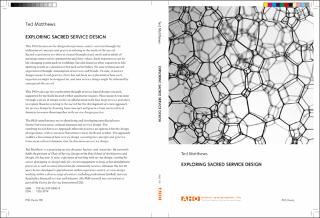Exploring Sacred Service Design
Doctoral thesis
Accepted version

Permanent lenke
https://hdl.handle.net/11250/2758408Utgivelsesdato
2021Metadata
Vis full innførselSamlinger
- Design [33]
Sammendrag
This study focuses on the development of new service design approaches for the design of experience-centric services through the integration and utilization of concepts and practices relating to the study of the sacred. During the rapid expansion and acceptance of service design as an established approach to service development, much attention has lately been given to the discipline’s role as an agent for the improvement of public sector services through user-centered innovation. However, less attention has been given to ways in which service design might contribute to the design of experience-centric services. Experience-centric services refer to services that lift the experiential with a designed intentionality as a crafted, differentiating element of the service offering (Zomerdijk & Voss,2010). At the same time, it has been shown that consumers are sharing extraordinary experiences through a form of sacralization of products and services (Belk, Wallendorf & Sherry. Jr, 1989). Such a phenomenon would seem to offer potential for new forms of experience-centric services. This
PhD therefore has honed in on the study of the sacred as a possible area from which to glean fruitful practices and concepts for the development of new approaches for the design of experience-centric services. In doing so, it has drawn from approaches, concepts and practice from socio-cultural domains to weave this together with service design practice to develop a new service design approach. The main methodological approach of this PhD is research through design (RtD) supported by practice-based design and research methods located within qualitative inquiry. This was done through a series of design cycles in collaboration with four, large Norwegian service providers in real life cases, running for periods of six weeks to eight-month durations. The main contribution of the research can be found in the resulting
Sacred Services Approach, which is the main finding of the research. This is supported through the descriptions of the process and outcomes of the real-life case studies. Further reflection and implications are offered as part of the conclusion of the work. Through the evelopment of the Sacred Services Approach, the thesis contributes in three main ways: Analytically, it identifies and develops interdisciplinary themes and perspectives between sociocultural domains and service design. In regard to service design research, it develops an approach that enables a discussion and exemplification of how service design can integrate approaches, concepts and practice from socio-cultural domains into the discourse on service design to broaden its current framing. For service design practice, it develops an approach that is a useful and useable blueprint for the design of experience-centric services, specifically for what I refer to as ‘sacred customer experiences.